The Golden Age of Science Fiction: The Fountains of Paradise by Arthur C. Clarke
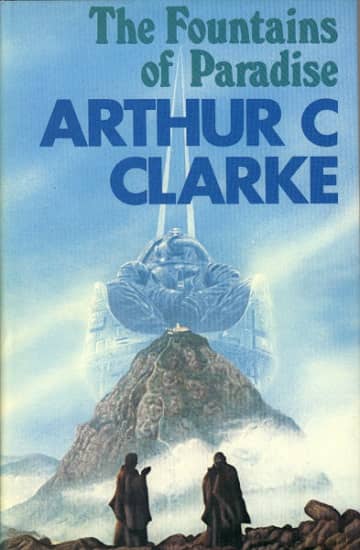 |
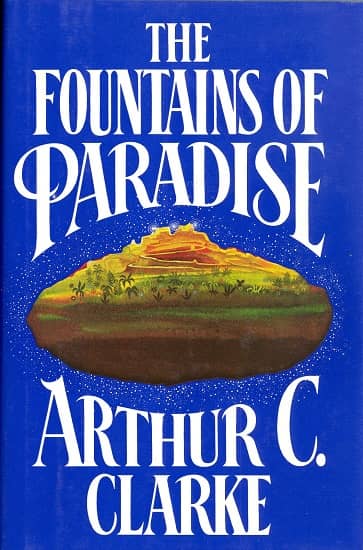 |
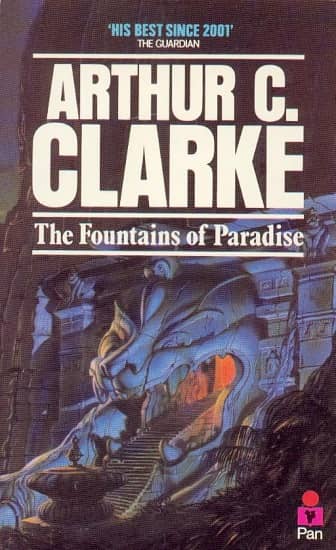 |
| Cover by Terry Oakes | Cover by Paul Bacon | Cover by Chris Moore |
Peter Graham is often quoted as saying that the Golden Age of Science Fiction is 12. I was reminded of this last year while reading Jo Walton’s An Informal History of the Hugo Awards (Tor Books) when Rich Horton commented that based on Graham’s statement, for him, the Golden Age of Science Fiction was 1972. It got me thinking about what science fiction (and fantasy) looked like the year I turned twelve and so this year, I’ll be looking at the year 1979 through a lens of the works and people who won science fiction awards in 1980, ostensibly for works published in 1979. I’ve also invited Rich to join me on the journey and he’ll be posting articles looking at the 1973 award year.
The Hugo Award was first presented at the 11th World Science Fiction Convention (sometimes called Philcon II), held in Philadelphia from September 5-7, 1953. That year the award for Best Novel, not yet known as a Hugo Award, was given to Alfred Bester’s The Demolished Man. The awards were not perceived as an annual event at that time and, in fact, no awards were presented the following year. They were presented again in 1955 and have been presented annually since, although in 1957, the Best Novel category was not included. The Best Novel Awardhas been referred to, with some tongue in cheek, as “the Big One” and is generally the last one announced at the ceremony. The Hugo Awards are nominated and voted on by the members of the World Science Fiction Convention. Clarke won the Hugo Award for Best Novel twice, for Rendezvous with Rama in 1974, and for The Fountains of Paradise in 1980. In 1980 the Hugo Award was presented at Noreascon Two in Boston, Massachusetts on August 31.
The Nebula Award was created by the Science Fiction Writers of America (SFWA) and first presented in 1966, when the award for Best Novel was won by Frank Herbert for Dune. It has been presented annually since then, with a tie in 1967 when it was won by Samuel Delany for Babel-17 and Daniel Keyes for Flowers for Algernon. Clarke won the Nebula Award for Best Novel twice, for Rendezvous with Rama in 1974 and for The Fountains of Paradise in 1980.
It has been several decades since I read The Fountains of Paradise, and re-reading it I realized that I had no real memories of it at all. I remembered that the central point of the book was to build a space elevator from a peak in Sri Lanka (repositioned and renamed Taprobane in the novel), but absolutely nothing else.
Re-reading it, I discovered that Clarke introduces the “Starglider,” an alien probe that passes through the solar system in the middle of the book like a repeat from Rendezvous with Rama, which had been published six years earlier. Unlike the spaceship in Rendezvous with Rama, humanity can interact and trade information with the Starglider and the sharing of information with the spaceship provides useful technological advances, which are mostly overlooked within the confines of this particular novel.
Clarke also espouses an anti-religious point of view, celebrating the death of traditional religions, although at the same time he includes a Buddhist sanctuary as a main point, although it serves as a hindrance to the novel’s protagonist. This anti-religious fervor would continue through his future novels, even when it didn’t really belong. In fact, religion does play a role in the mindset of people throughout the novel and Clarke’s protagonist must deal with it, although Clarke has a tendency to present religion with a more secularly philosophical model than a religious basis.
In some ways The Fountains of Paradise feels like three separate works. There is an exploration of the mythical history of Tabrobane, which focuses on the ancient king Kalidasa and his successful usurpation of the throne and the establishment of his gardens and the monastery on Sri Kanda. There is the interspersed look at the passage of the Starglider through the solar system, and there is the primary novel, about Vannevar Morgan’s attempts to build a space elevator, with the terrestrial terminus on Sri Kanda. While the mythical portion sets up part of the conflict for the location of the space elevator, the story of Vannevar Morgan’s elevator seems predictable. From the first time it is proposed, the reader knows that there will be economical, political, and technological barriers to overcome and that at some point during its construction and opening there will be a major failure. Clarke hits all of these notes and doesn’t provide suspense or enough character development to make the novel particularly memorable, despite it having won the two major awards of the year.
To win the Hugo Award for Best Novel, The Fountains of Paradise beat out John Varley’s Analog Award winning Titan, Frederik Pohl’s National Book Award winning Jem, Patricia A. McKillip’s Locus Award winning Harpist in the Wind, and Thomas A. Disch’s Campbell Award winning On Wings of Song.
The Fountains of Paradise topped Pohl, Disch, and Varley’s novels as well as Kate Wilhelm’s Juniper Time and Richard Cowper’s The Road to Corlay to win the Nebula Award for Best Novel.
 Steven H Silver is a sixteen-time Hugo Award nominee and was the publisher of the Hugo-nominated fanzine Argentus as well as the editor and publisher of ISFiC Press for 8 years. He has also edited books for DAW and NESFA Press. He began publishing short fiction in 2008 and his most recently published story is “Webinar: Web Sites” in The Tangled Web. Steven has chaired the first Midwest Construction, Windycon three times, and the SFWA Nebula Conference 6 times, as well as serving as the Event Coordinator for SFWA. He was programming chair for Chicon 2000 and Vice Chair of Chicon 7.
Steven H Silver is a sixteen-time Hugo Award nominee and was the publisher of the Hugo-nominated fanzine Argentus as well as the editor and publisher of ISFiC Press for 8 years. He has also edited books for DAW and NESFA Press. He began publishing short fiction in 2008 and his most recently published story is “Webinar: Web Sites” in The Tangled Web. Steven has chaired the first Midwest Construction, Windycon three times, and the SFWA Nebula Conference 6 times, as well as serving as the Event Coordinator for SFWA. He was programming chair for Chicon 2000 and Vice Chair of Chicon 7.
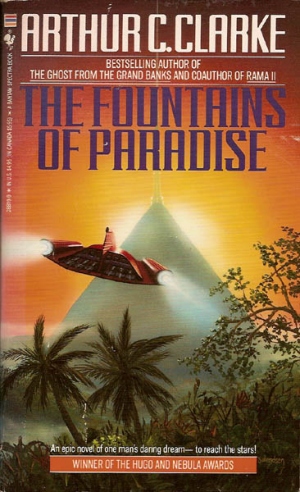
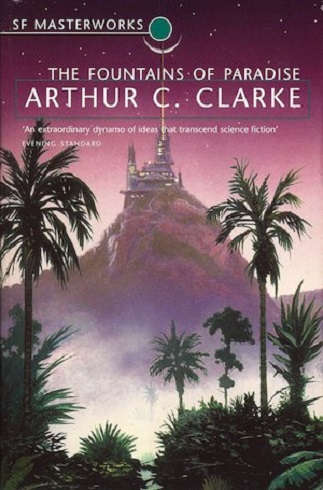
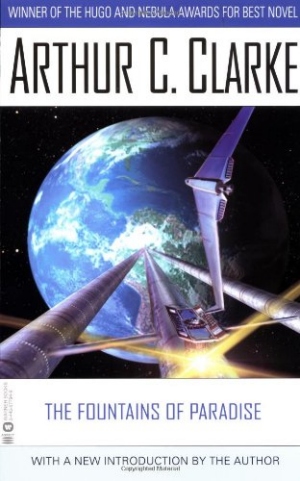
I actually quite liked THE FOUNTAINS OF PARADISE (review here: https://www.sfsite.com/01a/fp95.htm). That said, either ON WINGS OF SONG or JEM clearly should have won among the nominees. And the best SF novel of 1979, by really wide margin in my opinion, was John Crowley’s incredible ENGINE SUMMER. Ursula Le Guin’s MALAFRENA is another novel I love from 1979, though it’s only marginally SF.
The one great flaw in THE FOUNTAINS OF PARADISE is, as you note, the treatment of religion. Clarke simply didn’t get religion, and there’s a line in the book, as I recall, that suggests that when humans hear from the alien probe proof that all religions are false, they all say, more or less, “Oh well, I see that now”, and abandon their beliefs immediately. The level of obtuseness it took for Clarke to believe THAT would happen is remarkable.
I’ll get around to On Wings of Summer when I look at the Campbell Award winner and Jem when I look at the National Book Award winner, both of which Engine Summer was nominated for (as well as the British Science Fiction Association Award), but failed to win. Malefrena wasn’t nominated for any awards.
And religion continued to be an issue for Clarke. When I reviewed his novel 3001, I commented, “An extrapolation of Clarke’s which I find difficult to swallow is the ease with which his civilization manages to shed themselves of traditional gods and religions. Due in a large part to the monolith, the old religions have practically disappeared and “God” has become a curse word. The deity of myriad modern religions has been replaced by a sense that the Monolith and/or its makers should be revered. While I have no doubt that the appearance of the monolith would cause a decline among numbers of many (if not all) major religions, I also think that millions of people would turn to their religions for answers and most religions would come up with a satisfactory explanation of the monolith. The aetheistic utopia Clarke portrays does not seem particularly likely to happen.”
Looks like our Golden Ages happened at almost exactly the same time.
I don’t think I was reading much new stuff in 1979 — mostly plowing through old Asimov and Heinlein, and obsessively rereading Lord of the Rings. Maybe John Carter of Mars as well?
I know I read some Clarke back in the day — the novelization of 2001, Tales from the White Hart, Childhood’s End, Rendezvous with Rama — but he never quite took for me the way some of the others did. This book is one I never quite got around to, for whatever reason.
I turned 12 in 1957, so my science fiction landscape was quite different. I’ve gone back and reread many of the books I enjoyed then and through high school (until 1962) and some hold up, some don’t. I recently read The Sands of Mars by Clarke, and found it of only moderate interest.
I enjoyed the Fountains of Paradise. What Clarke is capable of doing, he does fairly well here – not as well as he’d ever done it, certainly, but fairly well – but what you say about his treatment of religion is quite true.
There seem to be few people – even if they’re highly intelligent, as Clarke of course was – who are capable of really understanding why someone else would think differently than they do. Even with the best will in the world, it’s often difficult not to regard contrary views as anything other than the result of stupidity or willful perverseness. This hit me strongly a little while ago when I read Mack Reynold’s Black Man’s Burden. When Reynolds introduced a character to speak against what was clearly the author’s own position, the character and his arguments were so weak and so easily brushed aside as to be embarrassing. Even while apparently wanting to give time to the other side, Reynolds was incapable of creating anything other than the flimsiest of straw men.
I think that when writers deal with religious/political/social positions that they don’t themselves share, they should seek out some intelligent, good-faith opponent who does hold those views, to at least vett those sections. If they’re interested in not looking like jackasses, that is!
Fountains of Paradise was one of my favorite science fiction novels. Blatant propaganda to build a space elevator when technology allows – and I’m all for it, beats another tax break to the Koch bros. Also a love letter to Sri Lanka, where Clarke retired to.